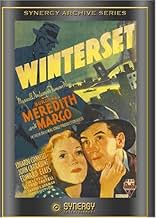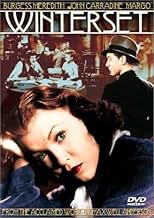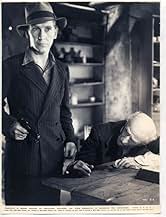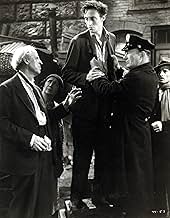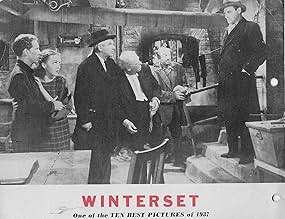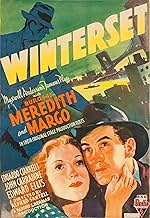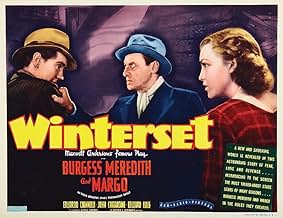AVALIAÇÃO DA IMDb
6,1/10
526
SUA AVALIAÇÃO
Adicionar um enredo no seu idiomaImmigrant radical Bartolomeo Romagna is falsely condemned and executed for a payroll robbery. Years later, his son Mio sets out to find the truth of the crime and to bring to account the gan... Ler tudoImmigrant radical Bartolomeo Romagna is falsely condemned and executed for a payroll robbery. Years later, his son Mio sets out to find the truth of the crime and to bring to account the gangster Trock Estrella.Immigrant radical Bartolomeo Romagna is falsely condemned and executed for a payroll robbery. Years later, his son Mio sets out to find the truth of the crime and to bring to account the gangster Trock Estrella.
- Direção
- Roteiristas
- Artistas
- Indicado a 2 Oscars
- 4 vitórias e 4 indicações no total
Murray Alper
- Louie
- (não creditado)
- Direção
- Roteiristas
- Elenco e equipe completos
- Produção, bilheteria e muito mais no IMDbPro
Avaliações em destaque
WINTERSET was a big hit on Broadway and RKO's decision to retain Burgess Meredith, Margo, and Eduardo Ciannelli to repeat their original stage roles is a major reason for the success of the film version. That they were able to adapt their performances to the intimacy of the camera is remarkable. Maxwell Anderson's dialogue is naturalized considerably from its poetic original but enough of the beautiful lyricism is retained in Anthony Veiler's screenplay to make it a very special script. While Ted Hecht must have been very good on Broadway as Garth, Paul Guilfoyle's performance in the film resulted in perhaps his best and most important screen work. Two other performances deserve special mention. Stanley Ridges as Shadow is menacing without being paranoid as is his boss, played by Ciannelli. Ridges' bloody appearance in the Esdras doorway is one of the most shocking screen moments in 30's cinema. And Willard Robertson, who made a career out of playing impatient meanies is beautifully obstinate as the boorish patrolman. Russian actor Maurice Moscovitch makes his screen debut as Garth and Miriamme's father. A veteran of the Yiddish Theater, Moscovitch later played Paulette Goddard's father in THE GREAT DICTATOR but died before that picture's release. Another Russian, Mischa Auer, makes one of his rare dramatic appearances as a social radical.
The physical set is beautiful, especially the stone-style recreation of the alley and stairwells beneath the Brooklyn Bridge. Finally, the film boasts a rare original score by Nathaniel Shilkret. Shilkret was a longtime bandleader who made records for RCA. He was hired as part of the RKO music staff in 1936 to replace Max Steiner who was leaving to join fledgling org Selznick-International. Shilkret's bold compositions for WINTERSET enhance the theatricality of film, though most of the dupe prints extant on video reproduce the soundtrack with very limited fidelity.
For modern audiences with little patience for plays-made-into-films that represent their stage origins, WINTERSET will be a disappointment. But for those who can appreciate the care with which director Alfred Santell took to recreate much of the prosaic beauty of the Broadway original, WINTERSET will be a rewarding experience - if you can see it in a respectable copy.
The physical set is beautiful, especially the stone-style recreation of the alley and stairwells beneath the Brooklyn Bridge. Finally, the film boasts a rare original score by Nathaniel Shilkret. Shilkret was a longtime bandleader who made records for RCA. He was hired as part of the RKO music staff in 1936 to replace Max Steiner who was leaving to join fledgling org Selznick-International. Shilkret's bold compositions for WINTERSET enhance the theatricality of film, though most of the dupe prints extant on video reproduce the soundtrack with very limited fidelity.
For modern audiences with little patience for plays-made-into-films that represent their stage origins, WINTERSET will be a disappointment. But for those who can appreciate the care with which director Alfred Santell took to recreate much of the prosaic beauty of the Broadway original, WINTERSET will be a rewarding experience - if you can see it in a respectable copy.
Call it Vintage, if you will, but you will not call Winterset boring unless a world of interesting details bore you. The movie is full of sub-stories, full of details that bring back the early days of everyday troubled life for Americans, especially New Yorkers. While not actually typical, the story is one that hangs together.
I suspect the story plot and actor management of the story were perfected on Broadway long before going to film. It is both engaging and fascinating for movie buffs who are students of the perfected B/W film and is a study in filmography which makes one wonder if this is not the height of perfection, if you will, concerning films of that genre: Good story, good delivery and good conclusion.
The story is not one with a tragic ending for the principles. It is not one that builds up the viewer's expectations and hopes and then dashes them in the end. While there are hints of evil and tragedy, the people most deserving receive this end, the ones who deserve the best of the ending actually do get the best in the end.
The organ music is superb for selection and for an almost hypnotic melody that plays on in one's head for some time afterward. A nice, pleasant melody. And on it hangs the turning point in the movie, a grand hook to hang the ending.
The antics of the policeman is what one would expect of one of New York's finest of that era. A masterful job of acting.
Most of all, Margo! She was again engaging, spell-binding and her job well-done. She caused the viewer to want to provide her sympathy from a good and kind father, who was incapable of doing all he could for his children, and to a brother who was caught up in a crime and later regretted it and who endeavored to correct his mistake. Again, superb acting.
Overall, Winterset stands out as one of the most enjoyable movies I have ever watched. I try to share it with friends who have never seen it before. None who see it for the first time have been disappointed.
I suspect the story plot and actor management of the story were perfected on Broadway long before going to film. It is both engaging and fascinating for movie buffs who are students of the perfected B/W film and is a study in filmography which makes one wonder if this is not the height of perfection, if you will, concerning films of that genre: Good story, good delivery and good conclusion.
The story is not one with a tragic ending for the principles. It is not one that builds up the viewer's expectations and hopes and then dashes them in the end. While there are hints of evil and tragedy, the people most deserving receive this end, the ones who deserve the best of the ending actually do get the best in the end.
The organ music is superb for selection and for an almost hypnotic melody that plays on in one's head for some time afterward. A nice, pleasant melody. And on it hangs the turning point in the movie, a grand hook to hang the ending.
The antics of the policeman is what one would expect of one of New York's finest of that era. A masterful job of acting.
Most of all, Margo! She was again engaging, spell-binding and her job well-done. She caused the viewer to want to provide her sympathy from a good and kind father, who was incapable of doing all he could for his children, and to a brother who was caught up in a crime and later regretted it and who endeavored to correct his mistake. Again, superb acting.
Overall, Winterset stands out as one of the most enjoyable movies I have ever watched. I try to share it with friends who have never seen it before. None who see it for the first time have been disappointed.
I like this film. It is an interesting retelling of a point of view regarding one of America's most controversial trials - the 1921 - 1927 legal ordeal of Nicolo Sacco and Bartholomeo Vanzetti for the murder of two men in a payroll robbery in Massachusetts. Both were Italian anarchist immigrants in the U.S. Both were convicted by juries which were local Yankee in make-up, not having any non-Yankees on them. Certainly no Italian Americans. The judge, Webster Thayer, was an openly bigoted man. But thousands of people around the country and the world attacked the verdict, and demanded a retrial. Among those who attacked the trial was George Bernard Shaw, Edna St. Vincent Millay, Sinclair Lewis, Fiorello La Guardia, and (in a move that opened his later great judicial career) Felix Frankfurter. After going through appeals, and the revelations of a fellow prisoner that the payroll robbery was committed by a local criminal gang, the matter was left to a small commission headed by President Lowell of Harvard College. It turned out to be a whitewash. In the end, the two men were electrocuted. Thayer's and Lowell's reputations never recovered from this.
Scholars on the case are still divided on the guilt or innocence of the two defendants - some have suggested they were both railroaded, or that Sacco was more likely to be guilty, but Vanzetti was probably innocent. Today, nearly eighty years after their deaths they still remain a flash point regarding American bigotry. In 1977, on the 50th Anniversary of their deaths, Governor Michael Dukakis formally pardoned both men.
Maxwell Anderson wrote about the subject twice: the play WINTERSET and the play HIGH TOR. Anderson's reputation as a dramatist has been inflated over the years by critics like Brooks Atkinson. He could occasionally write a well done play, but he was not on the level of his contemporary Eugene O'Neill. O'Neill's tragedies (especially his final ones) was based on personal demons from his family and his life. O'Neill was also willing to experiment on stage with masks (THE GREAT GOD BROWN) or with internal counter-dialogs (STRANGE INTERLUDE) or even with trilogies based on Greek originals (MOURNING BECOMES ELECTRA). Anderson only experimented one way - he tried blank verse plays (ELIZABETH THE QUEEN, MARY OF Scotland), and did not do it too well. But here he obviously was passionately determined to defend the memory of the two Italian - American anarchists. His plot is based on developing the thread of the confession (mentioned above) that the murders were planned by a local criminal gang. The gang's leader is Eduardo Cianelli, a brutal criminal who framed the two men by stealing their car as the getaway car.
But the strength of the confession is furthered by claiming the judge was bribed (Thayer was biased but not bribed). Edward Ellis (best recalled as the missing inventor in THE THIN MAN) is the corrupt jurist, who is now a wandering derelict. Vanzetti's famous final letter from the death cell (an elegant final comment that is the basis of contention between Henry Fonda and Eugene Palette in THE MALE ANIMAL) is the basis for the elegant denunciation of the judge in the court by John Carridine (note that his character's first name is also Bartholomeo). Ironically, today, it is believed that elegant final message of Vanzetti may have been written in part by a reporter who supported the defendants.
The son and daughter of the dead men (Burgess Meredith and Margo) are seeking to prove their innocence. But they run against the determination of Cianelli, and his goons. The film is fascinating enough, and concludes satisfactorily (much more than the actual case did). The plot's conclusion also leads to a more prosaic point - if you plan to use a signal to destroy someone, don't forget that signal and use it yourself. See the film to understand that last point.
Scholars on the case are still divided on the guilt or innocence of the two defendants - some have suggested they were both railroaded, or that Sacco was more likely to be guilty, but Vanzetti was probably innocent. Today, nearly eighty years after their deaths they still remain a flash point regarding American bigotry. In 1977, on the 50th Anniversary of their deaths, Governor Michael Dukakis formally pardoned both men.
Maxwell Anderson wrote about the subject twice: the play WINTERSET and the play HIGH TOR. Anderson's reputation as a dramatist has been inflated over the years by critics like Brooks Atkinson. He could occasionally write a well done play, but he was not on the level of his contemporary Eugene O'Neill. O'Neill's tragedies (especially his final ones) was based on personal demons from his family and his life. O'Neill was also willing to experiment on stage with masks (THE GREAT GOD BROWN) or with internal counter-dialogs (STRANGE INTERLUDE) or even with trilogies based on Greek originals (MOURNING BECOMES ELECTRA). Anderson only experimented one way - he tried blank verse plays (ELIZABETH THE QUEEN, MARY OF Scotland), and did not do it too well. But here he obviously was passionately determined to defend the memory of the two Italian - American anarchists. His plot is based on developing the thread of the confession (mentioned above) that the murders were planned by a local criminal gang. The gang's leader is Eduardo Cianelli, a brutal criminal who framed the two men by stealing their car as the getaway car.
But the strength of the confession is furthered by claiming the judge was bribed (Thayer was biased but not bribed). Edward Ellis (best recalled as the missing inventor in THE THIN MAN) is the corrupt jurist, who is now a wandering derelict. Vanzetti's famous final letter from the death cell (an elegant final comment that is the basis of contention between Henry Fonda and Eugene Palette in THE MALE ANIMAL) is the basis for the elegant denunciation of the judge in the court by John Carridine (note that his character's first name is also Bartholomeo). Ironically, today, it is believed that elegant final message of Vanzetti may have been written in part by a reporter who supported the defendants.
The son and daughter of the dead men (Burgess Meredith and Margo) are seeking to prove their innocence. But they run against the determination of Cianelli, and his goons. The film is fascinating enough, and concludes satisfactorily (much more than the actual case did). The plot's conclusion also leads to a more prosaic point - if you plan to use a signal to destroy someone, don't forget that signal and use it yourself. See the film to understand that last point.
The chance to see Broadway players recreate their performances on film back in the day should never be missed. Burgess Meredith, Margo, and Eduardo Ciannelli recreate their stage roles from Winterset in this 1936 film. But the story itself is horribly dated, mostly with a lot of left wing rhetoric which gets in the way of the plot.
Probably back in 1936 no one cared as the cause of Sacco&Vanzetti was still fresh in everyone's mind. Today it is still debated by historians and legal scholars and the two working class Italian-Americans are still venerated in Italian-American households of a more liberal persuasion in their politics. But the average American today knows the case vaguely if at all today.
The men went to the electric chair in Massachusetts protesting their innocence as does John Carradine in this film. Before Carradine dies he imparts a sense of mission to his son who grows up to be Burgess Meredith to find the real guilty parties.
A review of the case by a law school class saying that the state electrocuted the wrong man brings new attention to the case, not something that Eduardo Ciannelli likes. He was the real trigger man in the case and now he's a big shot gangster.
Rather improbable events bring Meredith, Ciannelli, the judge Edward Ellis now a drunken derelict, Paul Guilfoyle another accomplice, Guilfoyle's father Maurice Moscovitch and his sister Margo all together on a rainy and stormy night.
Maxwell Anderson wrote the original play and I have to contrast it with another of his plays that made it to the screen, Key Largo. It was another film where various folks are trapped in a storm and interesting things happen. Winterset never really sheds its stage origins and can't shake the rhetoric. Contrast that to Key Largo which never loses your interest for a second and while most of the action takes place in a closed down out of season hotel where the cast is holed up you never get any sense of staginess in it. The rhetoric is there, but it never gets in the way of the story as in Winterset.
Even with Oscar nominations for Art Direction and Musical scoring Winterset is a relic of bygone days.
Probably back in 1936 no one cared as the cause of Sacco&Vanzetti was still fresh in everyone's mind. Today it is still debated by historians and legal scholars and the two working class Italian-Americans are still venerated in Italian-American households of a more liberal persuasion in their politics. But the average American today knows the case vaguely if at all today.
The men went to the electric chair in Massachusetts protesting their innocence as does John Carradine in this film. Before Carradine dies he imparts a sense of mission to his son who grows up to be Burgess Meredith to find the real guilty parties.
A review of the case by a law school class saying that the state electrocuted the wrong man brings new attention to the case, not something that Eduardo Ciannelli likes. He was the real trigger man in the case and now he's a big shot gangster.
Rather improbable events bring Meredith, Ciannelli, the judge Edward Ellis now a drunken derelict, Paul Guilfoyle another accomplice, Guilfoyle's father Maurice Moscovitch and his sister Margo all together on a rainy and stormy night.
Maxwell Anderson wrote the original play and I have to contrast it with another of his plays that made it to the screen, Key Largo. It was another film where various folks are trapped in a storm and interesting things happen. Winterset never really sheds its stage origins and can't shake the rhetoric. Contrast that to Key Largo which never loses your interest for a second and while most of the action takes place in a closed down out of season hotel where the cast is holed up you never get any sense of staginess in it. The rhetoric is there, but it never gets in the way of the story as in Winterset.
Even with Oscar nominations for Art Direction and Musical scoring Winterset is a relic of bygone days.
From RKO studios in 1936 (though it looks as though it were made in the earliest 30s), during the heyday of the Astaire-Rogers musicals, came something rich and strange. Maxwell Anderson's very serious poetic play was boiled down into a movie that's part Depression-era gangster flick, part Shavian social-issue drama, and part neo-Greek tragedy.
The igniting fuse was the Nicola Sacco/Bartolomeo Vanzetti case of 1927, where two immigrant anarchists were condemned (some would say railroaded) to death supposedly for a robbery in which guards were killed. Anderson pushes it back to 1920 and focuses on a single man, Bartolomeo Romagna (John Carradine), whose auto, filled with anarchist/socialist tracts, is stolen for a similar crime by gangster Eduardo Cianelli. When condemned, Carradine eloquently rebukes the judge (Edward Ellis).
The film now flashes forward to 1936, when Romagna's down-and-out drifter son (Burgess Merdith), spurred by revisionist theories of the case, journeys to New York to confront the surviving principals, including Cianelli, Ellis and a reluctant witness (Paul Guildfoyle). All converge for a reckoning preordained by The Fates....
Anderson has heightened his dialogue to lend it immortal aspirations (which may have been a grandiose miscalculation the dominant rhetorical mode of the twentieth century, obvious even by 1936, is flatting). The high-flown posture extends to the look of the film, too a stylized nightscape that's a harbinger of the look of film noir to come a few years later. A low-ceilinged tenement-basement flat is oppressively claustrophobic (markedly so, given the number of actors crammed into it), while the cobblestones and stone arches of the low-rent streets near New York's waterfront glisten wickedly in the pelting rain. (At times the slums look like the central squares of those Transylvanian villages so common in Universal horror pix of this era).
Almost every element of Winterset should seem laughable now but doesn't (though there are a few close shaves). There's an early sequence involving a hurdy-gurdy that lures the slum-dwelling underclass out of its burrows to dance that's hauntingly powerful as is the face of Winterset's love interest, an actress known as Margo, that harks back to the expressiveness of the silents.
The igniting fuse was the Nicola Sacco/Bartolomeo Vanzetti case of 1927, where two immigrant anarchists were condemned (some would say railroaded) to death supposedly for a robbery in which guards were killed. Anderson pushes it back to 1920 and focuses on a single man, Bartolomeo Romagna (John Carradine), whose auto, filled with anarchist/socialist tracts, is stolen for a similar crime by gangster Eduardo Cianelli. When condemned, Carradine eloquently rebukes the judge (Edward Ellis).
The film now flashes forward to 1936, when Romagna's down-and-out drifter son (Burgess Merdith), spurred by revisionist theories of the case, journeys to New York to confront the surviving principals, including Cianelli, Ellis and a reluctant witness (Paul Guildfoyle). All converge for a reckoning preordained by The Fates....
Anderson has heightened his dialogue to lend it immortal aspirations (which may have been a grandiose miscalculation the dominant rhetorical mode of the twentieth century, obvious even by 1936, is flatting). The high-flown posture extends to the look of the film, too a stylized nightscape that's a harbinger of the look of film noir to come a few years later. A low-ceilinged tenement-basement flat is oppressively claustrophobic (markedly so, given the number of actors crammed into it), while the cobblestones and stone arches of the low-rent streets near New York's waterfront glisten wickedly in the pelting rain. (At times the slums look like the central squares of those Transylvanian villages so common in Universal horror pix of this era).
Almost every element of Winterset should seem laughable now but doesn't (though there are a few close shaves). There's an early sequence involving a hurdy-gurdy that lures the slum-dwelling underclass out of its burrows to dance that's hauntingly powerful as is the face of Winterset's love interest, an actress known as Margo, that harks back to the expressiveness of the silents.
Você sabia?
- CuriosidadesBurgess Meredith, in his first film with a credited role, recreates the role he played in the original Broadway production.
- ConexõesFeatured in Sprockets: Masters of Menace (1995)
Principais escolhas
Faça login para avaliar e ver a lista de recomendações personalizadas
- How long is Winterset?Fornecido pela Alexa
Detalhes
- Data de lançamento
- País de origem
- Idiomas
- Também conhecido como
- Winterset
- Locações de filme
- Empresa de produção
- Consulte mais créditos da empresa na IMDbPro
- Tempo de duração1 hora 17 minutos
- Cor
- Proporção
- 1.37 : 1
Contribua para esta página
Sugerir uma alteração ou adicionar conteúdo ausente

Principal brecha
By what name was Os Predestinados (1936) officially released in India in English?
Responda
